How Often to Change Air Filter in Condo And How to Install
The frequency of air filter replacement in apartments depends on various factors. Typically, filters are replaced every 60-90 days. However, for households with allergies, asthma, infant care, pet lovers, and smoke relief needs, the frequency of replacing filters may be shortened to every 30 days or even less.
In this blog, we'll delve into how often to change the air filter in a condo to meet the unique needs of children, pets, allergy sufferers, and individuals with respiratory conditions. We'll also discuss how to choose the right filter type and provide practical tips for extending its lifespan while ensuring filtration efficiency and lowering operational costs.
What is an Air Filter Replacement and How Does It Work?
As the name suggests, air filter replacement is a filtration system built into air purifiers to filter and capture pollutants. It typically consists of 3-stage and 4-stage filtration systems, such as PP Pre-filter, HEPA, activated carbon, UV, ionization, etc. When indoor air is drawn into the air purifier's fan, it enters the 3 and 4-stage air filter system. During this process, pollutants in the air pass through our filtration system layer by layer and are captured and filtered, ultimately releasing clean and fresh air.
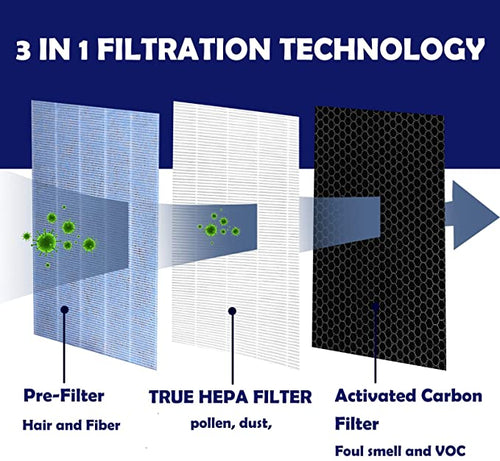
Why Change Air Filters and Their Importance in Condos?
Over time, air filters gradually accumulate a large amount of pollutants, leading to clogged filter pores and reduced filtration efficiency. Therefore, regularly checking and replacing air filters is crucial to ensure the continuous effective operation of air purifiers.
Air filters effectively filter out dust, pollen, bacteria, viruses, pet dander, hair, VOCs, and other pollutants in the apartment, allowing the purifier to release clean air into your apartment and maintain the health of every household member.
- Reduce factors that aggravate allergies and asthma
- Maintain fresh air
- Keep furniture clean
- Alleviate unpleasant odors in the apartment
- Effective filtration, saving energy and costs
How Often to Change Air Filter in My Home

Currently, most manufacturers' manuals recommend replacing disposable air filters every 3 to 12 months, but this range is too broad. Next, I will provide detailed explanations for different household situations and various types of filters, indicating how often you should replace an air filter.
| Type | Replacement Frequency |
|---|---|
| Allergies And Asthma | 6 Weeks |
| Pet Lovers | 20-45 Days(Multiple pets/ allergies or asthma/Pet shedding season) 60 Days(A small number of pets) |
| Smoke Relief | 60 Days |
| Baby Care | 2-3 Months |
| Odor-filled house | 9 Months |
How to Tell If an Air Filter Needs Changing?
Accurately speaking, there aren't strict guidelines to confirm when an air purifier needs replacement. So, we recommend checking your filter every few weeks. Do you detect any musty odors? Is the filter covered in dust?
- If contaminants have completely covered the filter material or are very dirty, it means you should replace the filter.
- To reach the service life of the filter element.
The most important thing is that many air purifiers now have filter lifespan indicators, which can intelligently monitor and display the current air quality and filter lifespan, such as the Membrane Solutions air filter replacement.
MSA3 air purifier
| Lights on | Mean |
|---|---|
| 4 lights on | Filter life 100% remaining |
| 3 lights on | Filter life 75% remaining |
| 2 lights on | Filter life 50% remaining |
| 1 light on | Filter life 25% remaining, order a new filter |
| light flash | replace the filter |
MS601 Anti-allergy Air Purifier
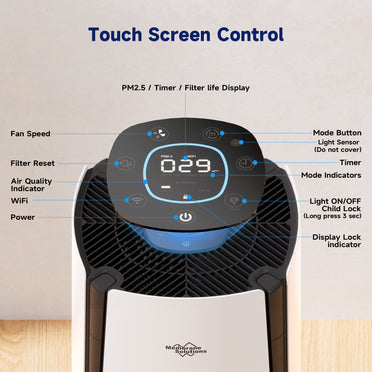
How to Replace an Air Filter?
Replacing an air filter is typically a relatively simple process. Below are the general steps.
Step 1: Open the air cleaning panel as shown
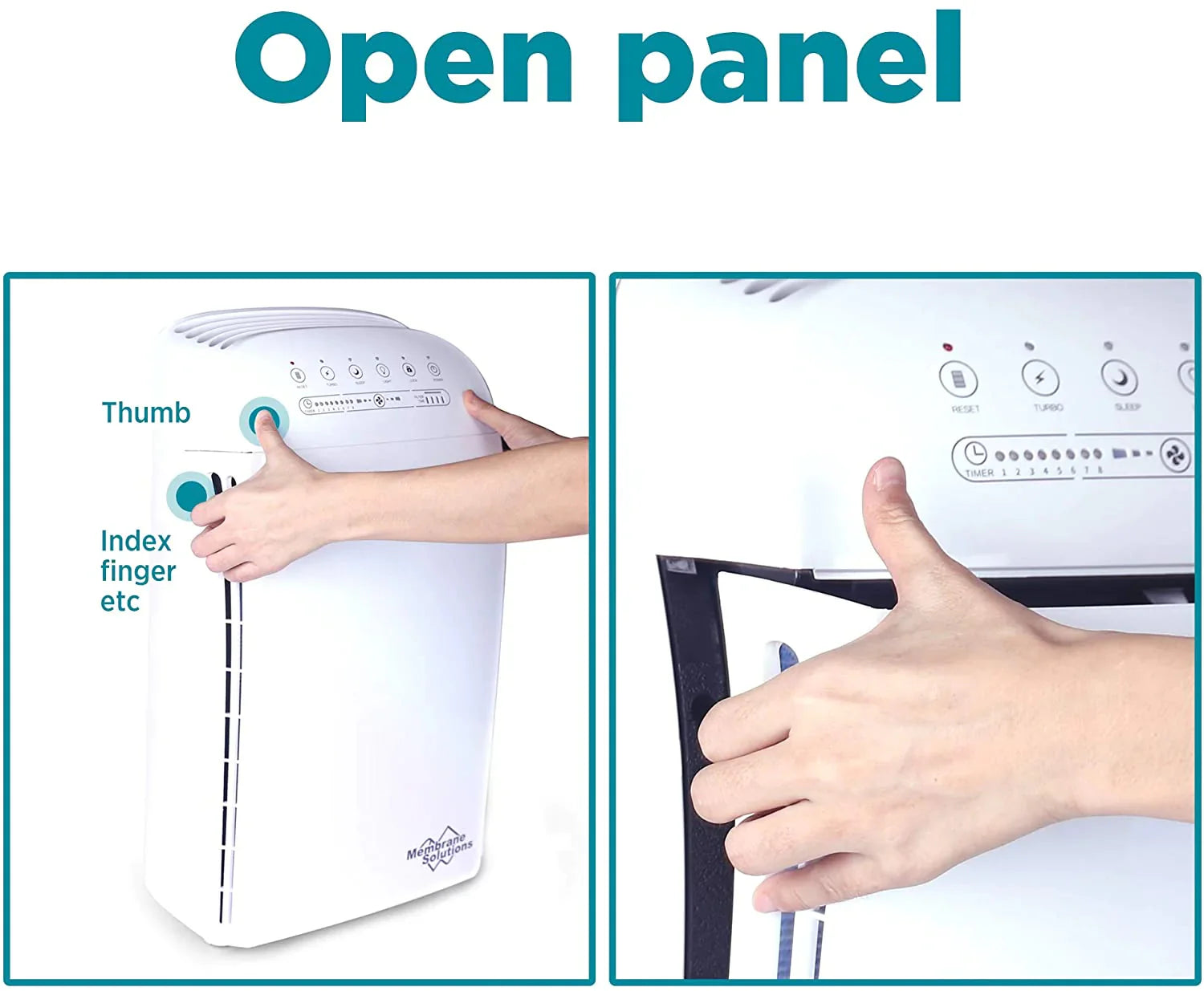
Step 2: Replace the filter
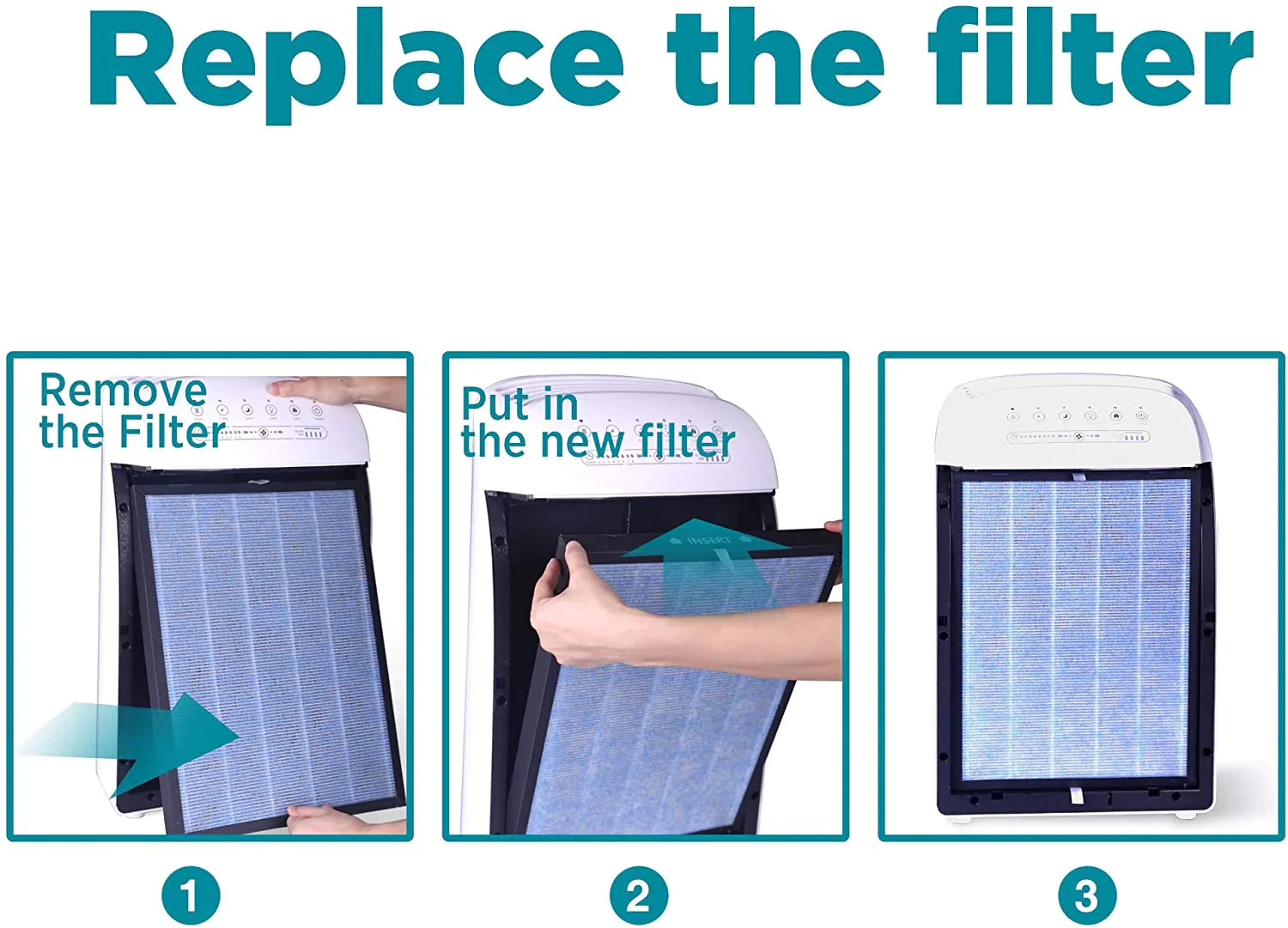
Step 3: Installation panel
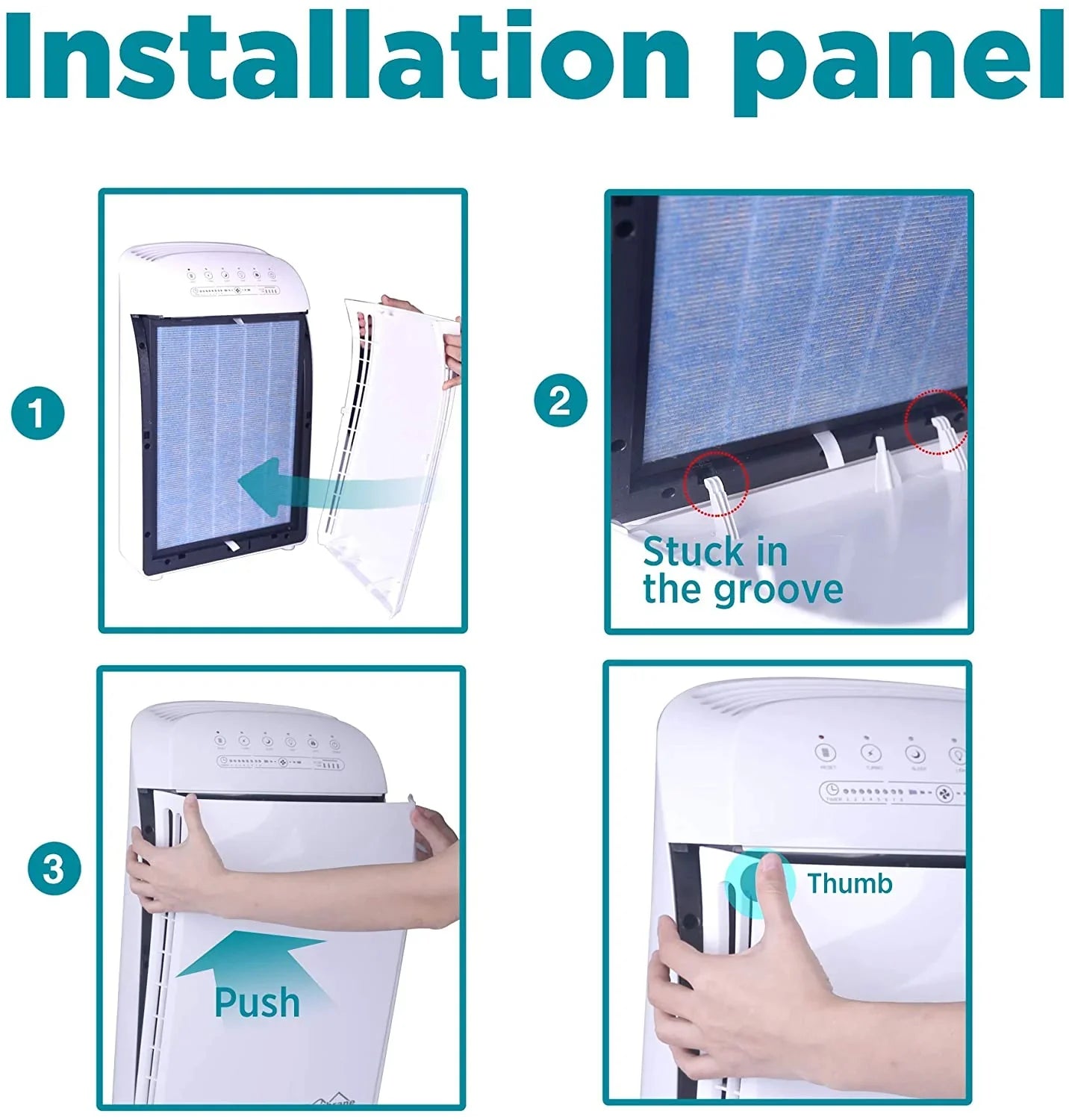
Step 4: Check the side
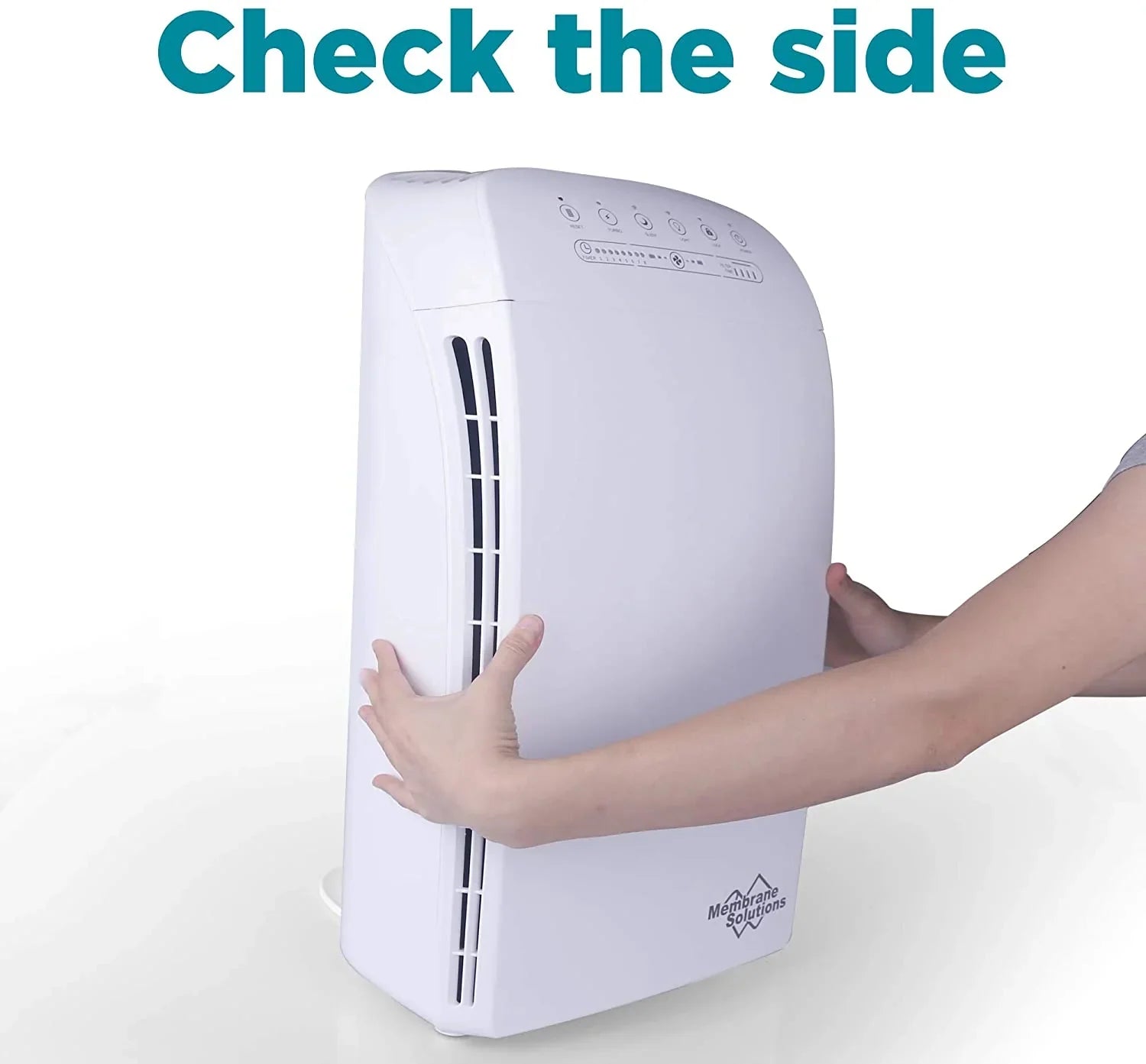
How to Extend the Lifespan of an Air Filter?
The primary factors that shorten the lifespan of a filter are poor air quality and frequent use.
Therefore, to extend the lifespan of a filter, the air purifier needs to operate in clean air. However, this contradicts the initial purpose of investing in it.
What Type of Air Filter Is Suitable for Me?
Choosing the right air filter is crucial for maintaining healthy indoor air quality and improving overall health. Factors to consider include room size, budget, noise levels, maintenance requirements, and other features.
Most importantly, determine the main purpose of use, such as filtering pollen, smoke, pet dander, or improving sleep quality.
| Filter Type | Suitable Scenarios | Lifespan |
|---|---|---|
| HEPA Filter | Allergy sufferers, asthma patients, high-efficiency air filtration needs | 3-12 months |
| Activated Carbon Filter | Environments requiring odor, smoke, volatile organic compounds (VOCs) removal | 3-6 months |
| UV-C Light | Environments needing bacteria, virus, and microorganism elimination | 3-6 months |
| Ionizer | Environments needing air cleaning and increased negative ion concentration | 2 years |
| Combination Filter | Combines multiple filtration technologies (HEPA+Activated Carbon+Pre Filter) to provide comprehensive air purification | 6-12 months |
Pros
- HEPA Filter:Efficiently captures small particles like pollen, dust mites, etc.
- Activated Carbon Filter:Absorbs and neutralizes odors and pollutants, providing long-lasting odor removal
- UV-C Light:Effectively kills microbes in the air, providing lasting disinfection
- Ionizer:Reduces particle content in the air
- Combination Filter:Utilizes multiple filtration technologies for comprehensive purification, suitable for various air purification needs
Cons
- HEPA Filter:High initial cost, requires regular filter replacement
- Activated Carbon Filter:Not effective for removing small particles
- UV-C Light:Potential harm to human health with prolonged exposure, ineffective for particle removal
- Ionizer:Produces ozone, potentially harmful with prolonged exposure, ineffective for odor and smoke removal
- Combination Filter:Requires regular replacement of multiple filters
MS601 Air Filter: 4-in-1 Highly Efficient Air Purifier with High-Precision Air Quality Sensor and Allergen Elimination
MS601 air purifier with a high-precision laser air quality sensor, featuring a unique allergen concentration detection function. It automatically adjusts the fan speed based on the current air quality and allergen concentration, helping you quickly filter out allergens and improve air quality in the shortest possible time.
The most noteworthy aspect is: MS601 is currently the first air purifier on the market to truly integrate an allergen concentration detection function.
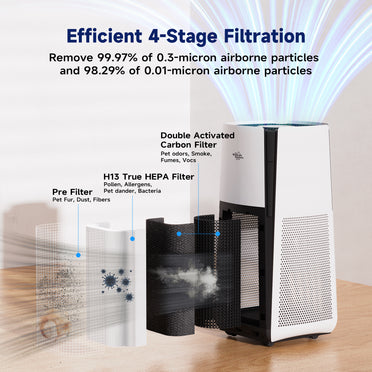
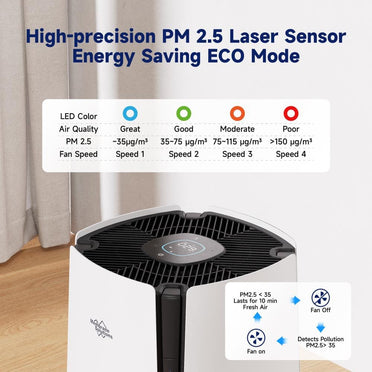
Conclusion
In summary, replacing the filter every 6 weeks to 9 months is highly reliable. The lifespan of the filter primarily depends on the air quality in the apartment, so it's advisable to check your air filter monthly.

